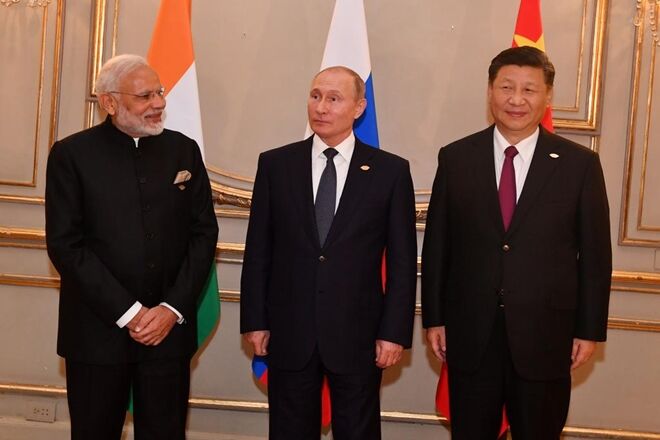Having referred to the abstention vote of India and China to the resolution on condemning the annexation of four regions in Ukraine by Russia at the Security Council of the United Nations introduced by the United States, Mehdi Shapouri in an interview with the site of Strategic Council on Foreign Relations spelled out:” Although India has good military relations with Russia and acquire a lion share of its weapons and military equipment from the country, but it is not strategic partner of Russia and in the international order that Russia follow, India does not consider itself as Russia’s all-out partner”.
Having reminded that in the Summit Meeting of Shanghai Cooperation Organization (SCO), Indian Prime Minister addressed Russian President and said war is not the solution of disputes, he added:” from strategic point of view, New Delhi is closer to the U.S. rather than Russia. Moreover, China is a strategic threat to India anyway, and Russia has good relations with China; therefore, in the triangle of relations, India would rather to have better relations with the U.S.”.
The analyst of international affairs stated that India is a member of newly formed coalition called QUAD in Pacific Ocean led by the U.S. and China assesses the coalition against itself. He said:” India moves within the framework of the U.S. equations even though it could have cast its positive vote against Russia. But it also tries to maintain its interests in connection with Russia. Likewise, the country does not wish to be in a position to make a choice between either the U.S. or Russia”.
India; Russian Strategic Partner?
Having underscored that India will never become Russia’s strategic partner, Shapouri added:” Russians also are aware of the situation and thus they make every effort to keep India in the state of limbo and hold the country in an impartial position”.
Having stated that bases of international order and laws have been questioned in Russian war against Ukraine, he noted:” referendum held by Russia was illegal and it was not defined in international laws and regulations that a country occupies part of the territory of another country and then holds a referendum and annexes it to its own territory. Therefore, both India and China had their own reservations on the resolution against Russia”.
Reasons of China’s Abstain Vote on the Recent Resolution against Russia
Having reminded that China has cast its abstain vote to all resolutions issued on Ukraine at the United Nations Security Council (UNSC) and the only exceptional case was its vote against the resolution for expelling Russia from Human Rights Council, the researcher of Institute of Strategic Studies said:” the negative vote of China was in connection with its challenges with the West on human rights issues and Beijing did not consider Moscow’s expel from the council in line with its interests”.
Shapouri called the abstain vote of China on the recent resolution against Russia in line with its foreign policy and explained:” China faces problems like secessionism and stresses that Taiwan is a part of China’s mainland, therefore, countries can not support the disintegration of a country and annexation of some parts of it to another country; although China has not waged any attack on Taiwan but it is concerned what will happen if Taiwan take steps towards holding a referendum in future? Therefore, Chinese severely stress on mainland national sovereignty and territorial integrity which is among the principles of their foreign policy”.
Having stated that China does not support Russian invasion of Ukraine and is not happy with that, he reminded:” After the meeting between Putin and Xi Jinping on the sidelines of Summit Meeting of Shanghai Cooperation Organization, it was announced that China is not happy with the state of war in Ukraine and Putin also said he had answered to the questions raised by Chinese friends and added that we thank balanced positions of China. His remarks show that Russians are aware that China does not completely stand by Russia on Ukraine”.
The expert of international affairs underscored:” Russia is experiencing difficult situations in Ukraine war and is concerned about its failure there. Hasty holding of the referendum which was initially supposed to be in November 2022, was made in view of the domestic atmosphere in Russia to show that Putin gained victory and to satisfy the opponents of failures to some extents and to tell the people that mobilization of forces was followed by the victory. China has also realized that Russia is not in a suitable position in Ukraine, therefore, it scrutinizes the situation with more reservation”.
Shapouri stated that with exception of the first few weeks, China’s positions are completely far from those of Russia, and now it is even further. He said:” at present situation, China does not see accompaniment with Russia in line with its own benefits. The war was definitely a strategic mistake made by Russia that violated international law. In fact, Russia has been entrapped in the pitfall made by the U.S. and NATO. The outbreak of the war is not basically acceptable to countries, and only a few countries actively supported Russia”.
The analyst of international affairs touched upon China’s need to Russian energy and said:” because of its need, China imports energy from Russia with preferential rate. This is made because Russian oil and gas have not been subjected to secondary sanctions and does not strike China’s interests. As American authorities have proclaimed China has never breached sanctions imposed on Russia and has observed the restrictions implied by the U.S.”.










0 Comments